- Home
- Richard Adams
The Plague Dogs: A Novel Page 36
The Plague Dogs: A Novel Read online
Page 36
“He didn’t recognize us,” said Snitter after a little, “and he obviously thought we couldn’t do any harm.”
“We can’t.”
“My feet are cold.”
“They’ll be colder if we stay here. We’ve got to find some sort of shelter. It may thaw by morning, as he said, but it’s cold enough to freeze your eyes out under this rock.”
“What a sad sight that would be,” said Snitter. “I couldn’t see anything, could I? Not a maggot not a mouse not a dustbin round the house. Cheer up, old Rowf. We might find the tod yet, and perhaps there’s a bit of the world somewhere that nobody wants. Anyway, wouldn’t you rather die here than in the whitecoats’ tank? I would. It’s little enough dignity we’ve got left. Of all the things the whitecoats stole, that’s what I feel worst about, I think. I hope we die alone, like decent animals.”
Sunday the 21st November to Monday the 22nd November
Digby Driver’s assessment of Mr. Geoffrey Westcott, though characteristically flippant, exaggerated and uncharitable, had nevertheless been—also characteristically—by no means entirely inaccurate. While Mr. Westcott had never, in fact, seen the inside of a police court, either in a defendant or any other capacity, there was, notwithstanding, a certain unscrupulousness in his make-up, together with a kind of self-centred, insensitive roughness. He lived largely by his own rules and sometimes stretched even them. Humanity in general he did not care for, preferring objects, especially artefacts; and he was not, as a rule, concerned to conceal this preference. When it came to getting the best out of fine or delicate mechanism, he had penetration and unlimited patience; for people, little or none. He possessed an above-average intellect and strong powers of concentration, but together with his solitary single-mindedness there went a potential (and at times something rather more than a potential) for intolerance and even fanaticism.
He had been the second of six children of a railway linesman, and in the cramped, overcrowded home had, in sheer self-defence, grown up tough and impervious. He had developed a preference for his own company, and a passion for acquiring and mastering technological instruments, so much more satisfying and solacing, in their smooth, controllable predictability, than the emotional inconsistencies of human relationships. During adolescence he grew still further apart both from his indigent parents and his rough-and-tumble brothers and sisters; and met with no opposition—rather the reverse—when, as soon as he had taken his A-levels, he left home and set up for himself. His family, in effect, forgot him.
He secured a good starting job at a bank in Windermere, yet it was not long before he came to be generally regarded as a misfit. Dour and quick to take offence, he tended to get on the wrong side of his colleagues and on more than one occasion displayed a total inability to appreciate the client’s point of view.
Westcott did not need people or want to get on with them. Living alone and without luxury, his income was already sufficient for more self-indulgence and private enjoyment than as a boy he had dared to hope for. His life-style took the form of a fairly rigorous régime of self-denial, directed towards the acquisition of a planned succession of fine technological durables. It would, perhaps, be tedious to catalogue his possessions—the prismatic compass, the Zeiss binoculars, the wrist-watch which could play “Annie Laurie” under water while displaying in fluorescent script the date and operative sign of the zodiac (or something like that), the quadraphonic gramophone which made the sound of a piano seem to come from four directions instead of one (which might have seemed strange even to poor Westcott if he had ever been able to stop fiddling with the controls long enough to listen with any concentration), the three electric shavers, and so on. Not his least source of pride and joy, however, was his small collection of guns and pistols. These were, of course, illegal, but sometimes, taking out one or another, he would risk a few rounds’ fire in suitably lonely and secluded places. He had a good eye and was no bad shot. With the only rifle he possessed—a Winchester .22—he reckoned himself particularly handy, and was fond of shooting match-sticks at twenty-five or thirty yards.
Some of his money had not been honestly come by. He had certain shady acquaintances and had more than once allowed himself, his car or his rooms to be made use of by these people.
Mr. Westcott possessed at any rate one friend and that was his landlady, Mrs. Rose Green, a middle-aged widow. In time an odd relationship grew up between these two, who had both experienced so little of what most people regard as affection. In winter, Mrs. Green would after a fashion reassure Mr. Westcott by pooh-poohing his fears of infection—for in this regard he was inclined to indulge a mild neurosis. When he was setting off for a long day on the Pillar or the Scafell range, she would make him sandwiches and admonish him to be sure to return punctually in the evening for oxtail stew. When she had a mind to spend a Saturday morning shopping in Keswick, Kendal or even Preston, Mr. Westcott, if he were not bound for the tops, would drive her there and back in the Volvo. They had little conversation—Mrs. Green was not a warm or talkative woman—but that in itself rather increased than diminished their mutual respect. For chat and laughter they felt, by and large, contempt.
The indignity, inconvenience and loss which Mrs. Green and he had suffered from the Plague Dogs aroused in Mr. Westcott all the brooding resentment of which he was capable (which was quite some), and this his dealings with Digby Driver had done nothing to allay. It was true that Driver had paid him quite well for the photographs, but while interviewing him Driver had—like many others before him—found himself disliking Mr. Westcott, who counted and pocketed the money without a word of thanks and tended to answer questions with a glowering and defensive “What? Well, for the simple reason that …” Driver had therefore begun to needle him, lightly but deftly, in his best Fleet Street manner, in his own mind comparing Westcott’s reactions to those of a bull pierced by banderillas. Mr. Westcott had parted from Driver with the surly feeling—which he had been meant to have—that some of these smart London fellows thought they were too damned clever by half. Although on the following day the police had succeeded in persuading him that he could with safety resume the use of his car, they had not, of course, cleaned up the mess of eggs, butter and mud which had soaked well into the back seat, while the germicidal fumigator used by the local authority had had a noticeable effect on the upholstery (already torn in two places by Rowf’s claws). Moreover the delicate valve-tuning, over which he had taken such pains, had been impaired by whoever had driven the car back to Windermere. Among his final questions to Digby Driver, before they parted, had been, “Why don’t you go out and settle the damn dogs yourself, instead of writing newspaper articles about them?” To which Driver, perhaps a trifle stung, after all, by the thrust, had managed to reply only “Oh, we’re content to leave that to burly dalesmen like you.”
The following night—the Sunday—Mr. Westcott was sitting alone in his room, morosely watching colour television and wrapping himself in two blankets when the gas fire (greedier in cold weather, like all lodging-house metered fires) had consumed the last shilling earmarked for its consumption until next day. (He was not going to raid the sinking fund intended for the purchase of a wet suit and scuba equipment.) The image of the pestilential dogs, macabre in appearance and lethal in effect, came stalking across his peace of mind as the Red Death through the irregular apartments of Prince Prospero’s castellated abbey. In his mind’s eye he saw himself relentlessly pursuing them over the Scafell range, tracking them across Helvellyn’s snowy wastes, following them from the larch copses of Eskdale to the plunging falls of Low Door. In his imagination their bodies, each neatly bullet-pierced through heart or brain, lay warm and still at last upon the fell. To hell with the Orator, with photographs, interviews or public acclaim. This ought properly to be an austere, individual vendetta, hunter against hunted, the putting of a salubrious and necessary stop to the dirty brutes who had had the audacity to spoil his car and gobble up three or four pounds’ worth of meat and grocerie
s. Having shot them, he would not even bother himself to go up to the bodies. He would simply walk away and go home.
By eleven o’clock his mind was made up. Monday and Tuesday were both, of course, working days, but under employment regulations he was entitled to take up to not more than two days’ sick leave of absence without a medical certificate, and after his known ordeal and at this wintry time of year no awkward questions were likely to be asked. True, if enquired for he would not in fact be at home, but in all probability he would not be enquired for, and in any case Mrs. Green would if necessary cover up for him. He would need to brief her to that effect before he set out. As for the chance of being seen on the hills by anyone who might tell the bank, it seemed too remote to take into account.
Methodically he checked and laid out his fell boots, clothing and equipment—thin and thick socks, mackintosh overtrousers, scarf, gloves, anorak, Balaclava helmet, vacuum flask, map, whistle, prismatic compass, binoculars and light pack, together with the four-foot-long, waterproof rope-and-alpenstock bag which had never housed an alpenstock but which he used to carry in concealment his Winchester .22, together with its telescopic backsight (in padded bag) and the screwdriver for mounting it. The tobacco man himself could not have been more deliberate in his preparations. When all was ready he undressed, washed briefly in tepid water, set his alarm clock for the usual time and went to bed wearing his socks, with his overcoat piled on top of his eiderdown.
At breakfast Mrs. Green clicked her tongue and shook her head, but made no effort to dissuade him. It never occurred to either of them to go in for anything so articulate or demonstrative as the discussion of opinions or the rational influencing of each other’s point of view. One might say, “Pass the salt,” or “I’m not leaving until this afternoon,” but one did not say, “I see this matter in rather a different light from you and will try to explain why.” Nor did it occur to them that if Mr. Westcott were to succeed in killing one or both of the dogs he might not, in the current state of publicity, be able to return as obscurely as he had set out. Neither was that kind of person. There had had to be sausages for Sunday dinner—of that Mrs. Green was still fully conscious—and apparently Mr. Westcott was not going to take it lying down. Good for him. She was also conscious of the need, in Mr. Westcott’s interest, for a well-buttoned lip. By twenty to ten he was on his way in the Volvo.
Mr. Westcott commenced by returning to the scene of the attack. He parked the car in the same place and waited to see whether the dogs would reappear. After half an hour they had not done so and he began considering his next step. On that morning two days ago, he reflected, they had apparently come down the fell from the east—probably more or less down the line of Fisher Gill. He had read in the paper of the panic caused by their appearance at a Glenridding farm a few days before. So it seemed most likely that they had some sort of lair in or under the Helvellyn range, somewhere between Thirlmere and southern Ullswater.
Mr. Westcott got out of the car, locked it, shouldered his pack and set off up Fisher Gill, in and out of the grass tussocks, over the soaking, spongey peat and moss and the last of the almost-melted snow. He was glad that he was going to have to make a search. He even hoped that it might turn out to be a long, hard one. He was determined to find and kill the dogs. It was an entirely personal conflict between himself and them, the spoilers of his possessions, the wreckers of scientific order. It ought not to be unduly easy, for he meant to prove to himself—or to someone—what he was worth in defence of his little realm. The dogs might have proved too much for everyone from Keswick to Hawkshead. They were not going to prove too much for him.
In the course of the next five and a half hours, until the fall of early darkness, Mr. Westcott covered thirteen miles. He was lucky enough to have no mist. Having climbed Sticks Gill up to the pass, where he saw but, since the snow was almost gone, could not follow for more than a few yards the vestigial tracks of two dogs, he spent some little time in searching with his binoculars the area between Stang and the reservoir. It was devoid of everything but curlews and buzzards, and at length he turned south and strode easily up to the summit of Raise. From there he made his way along the whole ridge—White Side and Low Man to Helvellyn itself—continually stopping to observe the slopes below. He paid particular attention to the sheltered Red Tarn basin between Striding Edge and Catstycam, where once, long ago, a terrier bitch had kept herself alive for three months, guarding the body of her master fallen from a precipitous height above. Someone had told him that the place was haunted, though neither Wordsworth’s nor Scott’s poems on the incident—both of which he had once taken the trouble to get hold of and read—told what had finally become of the dog.
White Side
Still bootless, he continued for two miles south to Dollywaggon Pike and, having stopped for about fifteen minutes to eat, began the rather tricky descent to the east, down the narrow, still-frosty Tongue. In these conditions of part-frost, part-thaw, the Tongue was more than a little dangerous, which was why Mr. Westcott chose it. He would have attempted the north face of Scafell if he had thought that to do so would give him a shot at the dogs. No course, whether involving fatigue, discomfort or actual danger, was going to remain unpursued, provided it held out the promise of success. More than once he slipped on the rocks of the Tongue but, undeterred, pressed on into the gully and so to the cascades of Ruthwaite Beck.
He returned northward across the valleys and ridges east of the Helvellyn heights; straight over peat and ling, rock and grass, stones and moss; Grisedale Forest, Nethermost Cove Beck, Birkhouse Moor and Stang End. There was no least sign of the dogs; and he met no one all day. He regained the car by way of Sticks Pass, wondering whether his best course would be to spend the following day on the Dodds to the north. He was still wondering when he got back to Windermere, to hear from Mrs. Green the news that on Sunday afternoon the dogs had been encountered in the high valley of Levers Water by a Coniston farmer looking for odd sheep to bring down out of the snow. He had recognized them at once and taken to his heels, but not before observing that they appeared thin and fair shrammed with the cold.
Digby Driver, hastening back to Coniston to learn nothing different from what he had already heard from other eye-witnesses on previous occasions, left this farmer after no more than fifteen minutes and, back in his room, fairly cursed with frustration.
“The bloody brutes—they’re just going to fizzle out—die up there—the whole thing’ll collapse without one more story, yucky or otherwise! Simpson’ll be livid! What a load of crap! Come on, Driver, you’re not beat yet! What to do? What to do? Well, we’ll just have to try the Research Station and hope for some sort of indiscretion. Any port in a storm!”
He rang up Lawson Park and this time, by some curious turn of the wheel, found himself talking to Dr. Boycott, who offered to see him by appointment forty-eight hours later, on the afternoon of Wednesday the 24th.
As has been said, Digby Driver had little time for set-piece, formal press interviews with official representatives. In his view—a not altogether inaccurate one—such interviews were often designed to soft-pedal or even to conceal things likely to provide material for news copy. It was usually more profitable to talk to the boot-boy or the cleaning-woman, but in this case he already had an even better contact, if only he could get at him.
“Look, Mr. Boycott,” he said, “it’s good of you to offer to see me, but the man I’d really like to talk to is Stephen Powell. Is he still off sick?”
“I’m afraid he is,” answered Dr. Boycott. “Why do you want to talk to Mr. Powell so particularly?”
“Because he was so darned helpful when I met him before, the day I drove him back from Dunnerdale. It was him that—oh, well, never mind. But I don’t want to waste your time unnecessarily, and it’ll suit me perfectly well just to have a word with Powell. Could you give me his address, perhaps?”
“Well, he’ll be back tomorrow or the next day, I understand,” said Dr. Boycott, “so if y
ou like we’ll both see you on Wednesday afternoon. Will three o’clock suit you? Excellent. Well, until then, good-bye.”
Tuesday the 23rd November
The following morning was more than a little misty on the tops, but nevertheless Mr. Westcott set out even earlier than before. Having reached Little Langdale, he was able to see that the northern end of the Coniston range was considerably less obscured by mist than the Old Man itself. Accordingly he ran up to the Wreynus Pass, left the Volvo and climbed the Grey Friar by way of Wetside Edge. The weather had become warmer and damp, with a light west wind, and he sweated in his anorak as he stood swinging his binoculars this way and that across the slopes above Seathwaite Tarn and Cockley Beck. There were no dogs to be seen. He crossed the saddle to Carrs, ate an early lunch and tramped southward to Swirral, Great How Crags and the Levers Hause. Here the mist was troublesome, and Westcott, knowing himself to be immediately above Levers Water and the very place where the dogs had last been seen two days before, went down as far as Cove Beck and covered that area very thoroughly indeed. He found nothing and climbed back to the Hause. His tenacious and obsessive nature was not yet dispirited but, like a fisherman who has not had a rise all day, he now made a deliberate demand on his concentration, persistence and staying-power to play the game out to the end and finish the day in style, win or lose. Who could tell? Mist or no mist, he might even now run slap into the dogs sheltering in a peat-rift or under a thorn. This, apparently, was what the farmer had done. Making use of his prismatic compass in the mist, he set off for Brim Fell, Goat’s Hause and the Dow Crag.
Carrs
“I’m very glad you’ve felt well enough to come back today, Stephen,” said Dr. Boycott. “There are several important things. I trust you’re quite recovered, by the way?”

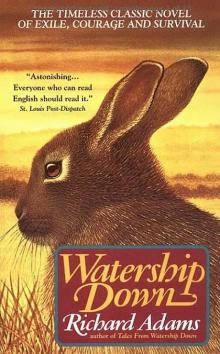 Watership Down
Watership Down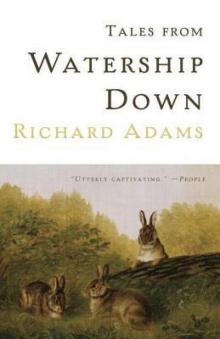 Tales From Watership Down
Tales From Watership Down Maia
Maia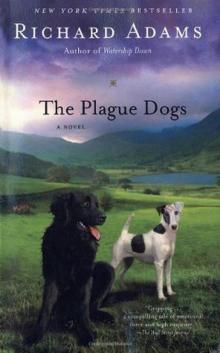 The Plague Dogs
The Plague Dogs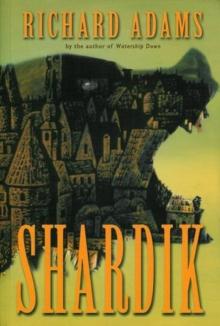 Shardik
Shardik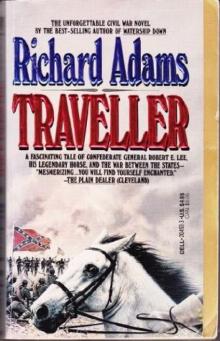 Traveller
Traveller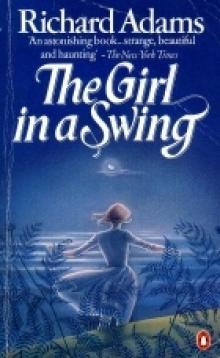 The Girl in a Swing
The Girl in a Swing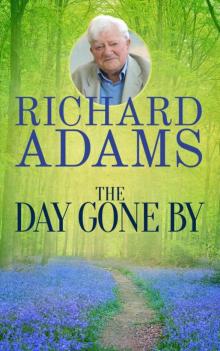 The Day Gone By
The Day Gone By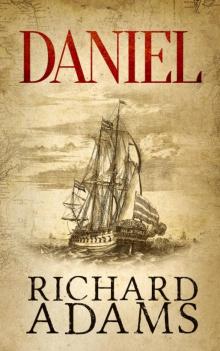 Daniel
Daniel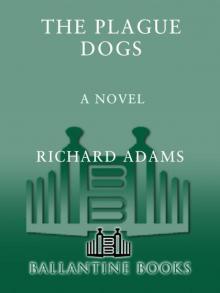 The Plague Dogs: A Novel
The Plague Dogs: A Novel